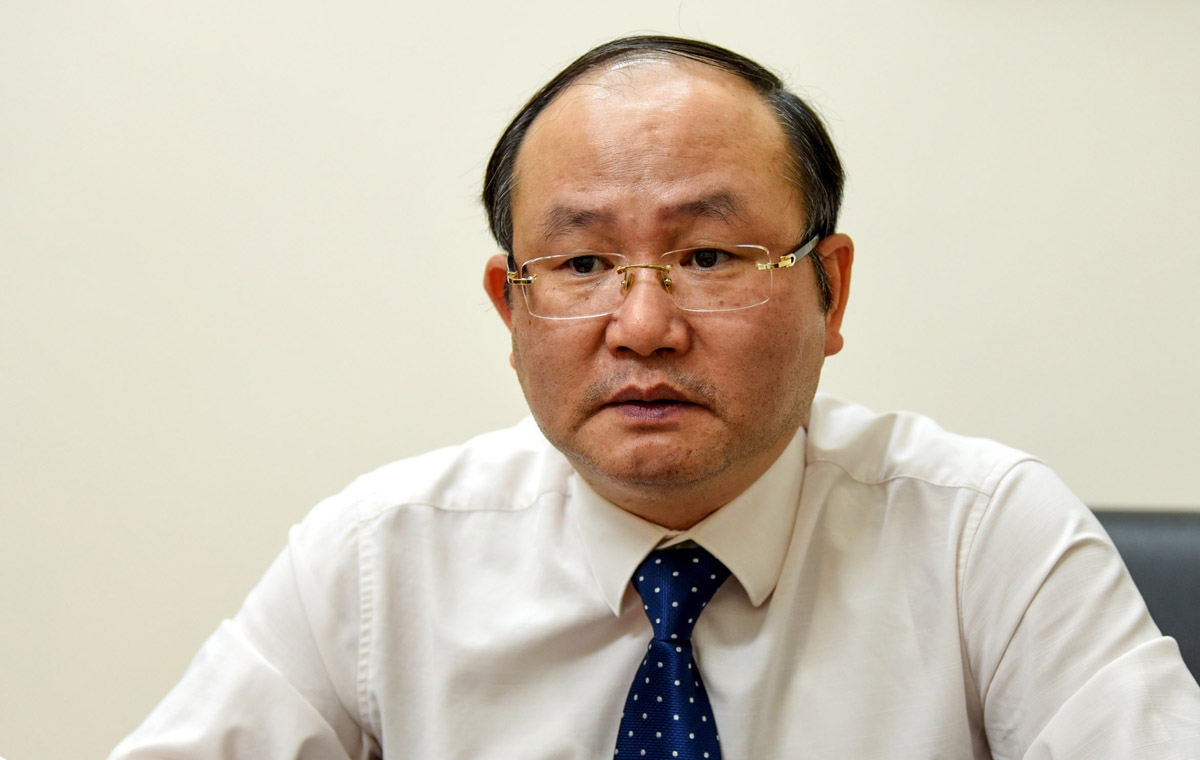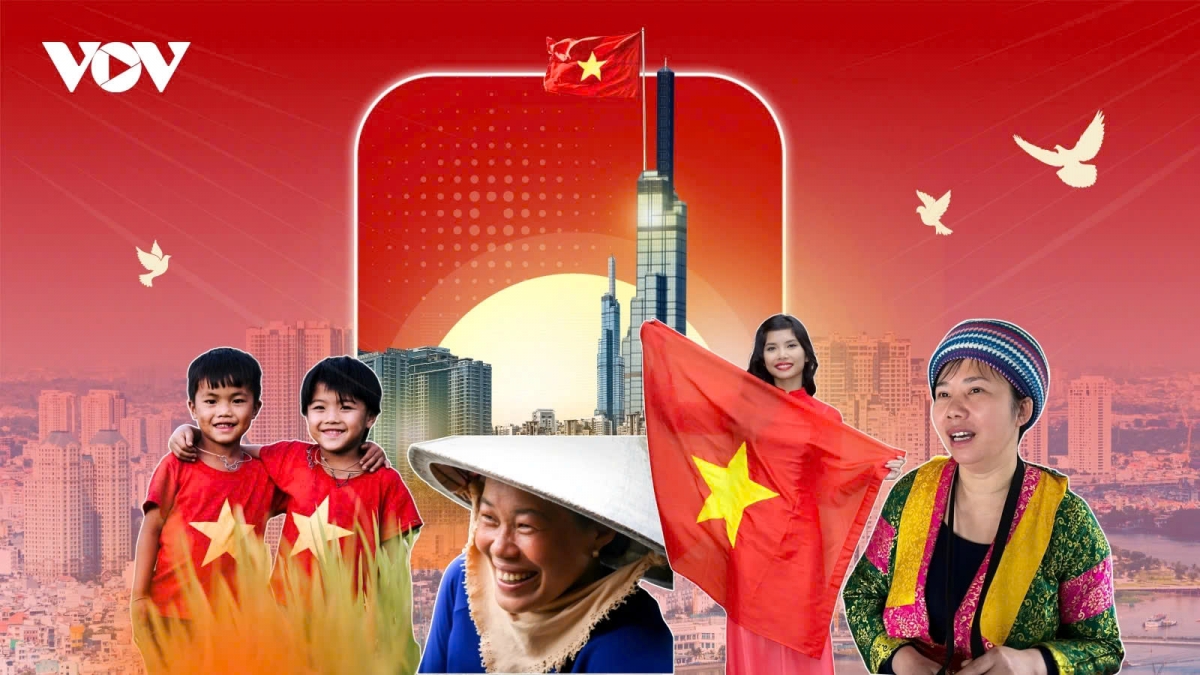Guaranteeing human rights for sustainable development in new era of advancement
VOV.VN - After implementing the Renovation process for four decades, Vietnam is entering a new era said to be the area of advancement that demands human rights and civil rights must be recognized, respected, ensured, and protected effectively.
Assoc. Prof. & Dr. Tuong Duy Kien, director of the Institute of Human Rights under the Ho Chi Minh National Academy of Politics made clear the connotation of recognizing, respecting, ensuring and protecting human rights and civil rights in the new era, in an exclusive interview granted to VOV.VN.
VOV: Recently, we have often referred to the phrase of the era of national advancement. How do you personally understand this concept from a human rights perspective?
Assoc. Prof. & Dr. Tuong Duy Kien: There can be different interpretations, but an era can be simply understood as a period marked by qualitative changes in society or the nation. The new era of the Vietnamese nation represents a new historical phase, during which strategic goals and tasks are achieved and completed, creating a turning point in the new development trajectory of the nation.
Since the era of Ho Chi Minh, from the founding of the state in 1945 to the present, Vietnam has experienced significant milestones such as the era of national independence, the era of national reunification, and the era of Đổi Mới (Renovation). Now, after 40 years of Renovation, we are officially entering a new era, striving to become a developing nation with modern industry and high average income by 2030 to mark the 100th founding anniversary of the Communist Party of Vietnam, and to become a developed nation with high income oriented towards socialism by 2045 to celebrate 100 years of the Vietnamese state.
From a human rights perspective, this new era opens a period in which each individual and every citizen can fully enjoy the basic rights and freedoms recognized by the Constitution and laws. This includes, above all, the right of the people to participate fully, effectively, and substantively in the affairs of the state and society; to exercise the right to master the country; to contribute to national construction and development; and to benefit from the outcomes of development and the results of the Renovation process.
VOV: Why is ensuring and promoting human rights an important factor for the country’s sustainable development?
Assoc. Prof. & Dr. Tuong Duy Kien: Human rights are the result of a long and arduous struggle by progressive humanity to protect core values such as the right to life and the respect for human dignity, aiming for an equal, free, and just society without any discrimination based on race, gender, language, beliefs, social status, or ethnicity.
In the history of the nation’s construction and defense, it is the unity of the people that has mobilized strength to withstand natural disasters and enemy aggression, maintain the race, and expand the borders and territory of the nation. Particularly during the Ho Chi Minh era, by promoting the human factor and the values of human rights (regardless of class, political party, age, gender, ethnicity, or religion), our Party has built the strength of the great unity bloc of the entire nation, successfully achieving the national democratic revolution and securing independence and freedom for the Fatherland.
Therefore, for a country to develop sustainably, it must pay special attention to respecting, ensuring, and protecting the rights of all individuals and groups, as well as each ethnic group living within its territory. This should be done with a view toward national solidarity, religious harmony, and class unity, in order to mobilize the strength and intellect of every person and group, thereby creating a symbiotic strength for the entire nation. This is the foundation for the sustainable development of the country.

VOV: In a recent letter to the National Conference on Human Rights, General Secretary To Lam mentioned the concept of “socialist human development” and emphasized the role and value of “socialist human rights” to create a driving force for national development in the new era. Is this a new concept, and what is the essence of the concept of “socialist human rights”? Why is it necessary to emphasize the socialist factor?
Assoc. Prof. & Dr. Tuong Duy Kien: The concept of “socialist human development” is not entirely new, but the notion of “socialist human rights” is being addressed for the first time by the highest leadership of the Party and State. This underscores the special importance of establishing directions in theoretical research, summarizing the practical experiences of 40 years of Renovation, and proposing a new theoretical foundation for the Communist Party of Vietnam regarding socialist human rights, as the country officially enters a new era of advancement.
“Socialist human rights” do not contradict the universal values of human rights, which our Party has repeatedly affirmed. Human rights are the result of a long and arduous struggle by the working people and oppressed nations worldwide, thereby making human rights a common value for humanity. We emphasize the socialist aspect primarily to affirm that socialist society is the best social system that humanity has experienced, for the sake of people and human rights. Only in socialism can human rights be truly guaranteed, and people be genuinely liberated, eliminating the system of one person exploiting another. In socialism, individuals have the conditions necessary for their comprehensive development, to fully enjoy all their rights and freedoms, and to be both the masters and owners of the country.
VOV: We are building a socialist law-governed state, a socialist-oriented market economy, and socialist democracy, and now we are enhancing the role and value of “socialist human rights”. So, what is the relationship between “socialist human rights” and the three other pillars?
Assoc. Prof. & Dr. Tuong Duy Kien: Our Party advocates building an independent and self-reliant economy linked to international integration based on three pillars: developing a socialist-oriented market economy, establishing a socialist law-governed state, and building socialist democracy, with a clear determination that people are at the center, as the subject, and serve as both the goal and the driving force behind national development. In the Renovation period, especially as we enter a new arising era, not only is it established that people are at the centre, but it is also determined that human rights are at the centre, serving as both the goal and the driving force behind national development.
Effectively implementing the basic rights and freedoms of individuals will be the foundation for realizing the perspective of putting people at the center. The significance of human rights in relation to the three pillars is particularly evident in that human rights are not derived from these pillars; rather, they serve as the foundation upon which a socialist-oriented market economy, a socialist democracy, and a socialist rule of law can be built. Therefore, there cannot be a genuine socialist-oriented market economy, a rule of law state, and socialist democracy without the recognition, respect, guarantee, and effective protection of human rights in society.
VOV: In the era of national rise, why do you emphasize the importance of effectively implementing the principle that citizens can do everything that the law does not prohibit? And how are civil rights inseparable from civil obligations?
Assoc. Prof. & Dr. Tuong Duy Kien: The new era requires us to mobilize all available resources for national development. This is one of the major concerns of General Secretary To Lam, who advocates the current guiding philosophy of “expanding the development space” and “ending the perspective that if it cannot be managed, it should be banned.”
In a socialist rule of law state, the operational principle must adhere to the supremacy of the Constitution and the law, ensuring that no one stands above or outside the law. However, the law in a rule of law state is intended to promote democracy, serve the people, and recognize, respect, guarantee, and protect human rights and civil rights. Therefore, it is essential to effectively implement the principle that citizens can do everything that the law does not prohibit. This means that based on the legal framework, if there is a prohibition, citizens must not act against it; conversely, if there is no prohibition, citizens are free to act. Thus, the law must be transparent, allowing citizens to exercise their rights and fulfill their obligations without leading to unnecessary legal violations.
This principle has also been reflected in Resolution No. 27/NQ-TW of the Party Central Committee regarding the continued construction and perfection of the socialist rule of law state of Vietnam in the new period.
Alongside the effective implementation of the principle that citizens can do everything the law does not prohibit, it is also necessary to deeply understand and effectively apply the principle that state officials and civil servants can only do what the law allows, and civil rights cannot be separated from their obligations. State officials and civil servants are only permitted to act within the law because they hold state power and operate state agencies. They must act according to the legal authority granted to them, and exceeding that authority can lead to abuse of power and violations of human rights and civil rights.
Moreover, the relationship between civil rights and obligations must be emphasized: when citizens enjoy rights, they must also fulfill their duties and responsibilities toward the state and society in which they live. This follows the principle that no one has rights without obligations, and conversely, no one can fulfill obligations without enjoying rights. Thus, rights and obligations are in a harmonious relationship, complementing each other rather than contradicting one another.
VOV: What is the significance of strengthening the inspection, supervision, and handling of legal normative documents that violate the Constitution and laws in ensuring human rights in the new era?
Assoc. Prof. & Dr. Tuong Duy Kien: The socialist rule of law state emphasizes the supremacy of the Constitution and laws, particularly requiring adherence to constitutional supremacy and the rule of law. This also demands compliance with the criteria of a legal system that is democratic, just, humane, comprehensive, consistent, unified, feasible, open, transparent, stable, easily accessible, and conducive to innovation, sustainable development, and the rigorous and consistent enforcement of laws.
To achieve this goal, it is clear that strengthening the inspection, supervision, and handling of legal normative documents that violate the Constitution and laws is of particular importance for ensuring human rights in the era of national advancement. This era demands that human rights and civil rights be recognized, respected, guaranteed, and effectively protected. Therefore, the urgent requirement, as stated by General Secretary To Lam, is to ensure that certain legal provisions do not become bottlenecks hindering the realization of human rights, civil rights, and socio-economic development.” Therefore, it is essential to enhance the inspection, supervision, and handling of legal normative documents that violate the Constitution and laws, which could lead to violations of human rights and civil rights.
VOV: Why must we make the principle of a human rights-based approach a mandatory requirement and evaluation criterion in the formulation and implementation of policies and laws at all levels?
Assoc. Prof. & Dr. Tuong Duy Kien: As I earlier mentioned, the socialist rule-of-law state emphasizes the constitution and laws, respecting, ensuring, and protecting human rights. In such a state, the law must promote democracy and serve the people, while also respecting, ensuring, and protecting human rights and civil rights. Therefore, it is crucial to incorporate the principle of a human rights-based approach as a mandatory requirement and evaluation criterion in the formulation and implementation of policies and laws at all levels.
Laws enacted by the National Assembly, as well as subordinate legal documents, must include an impact assessment concerning human rights to ensure that legal provisions are consistent with the human rights and civil rights as stipulated in the constitution and aligned with international human rights standards to which Vietnam is a party. This is a mandatory requirement for effectively recognizing, respecting, ensuring, and protecting human rights and civil rights within the socialist rule-of-law state.
VOV: What is the significance of developing a roadmap to reduce the death penalty in the Penal Code in ensuring human rights in the new development phase of the country?
Assoc. Prof. & Dr. Tuong Duy Kien: Vietnam currently does not have a plan to amend the 2015 Penal Code following amendments in 2017. However, the current legal system of our country still includes 18 offenses that carry the death penalty. According to international standards, there is no obligation for countries to abolish the death penalty in their penal codes, but they are encouraged to reduce its application and work towards its abolition. If the death penalty is still applied, it should only be reserved for particularly serious crimes, specifically intentional murder.
Statistics indicate that 170 countries and territories worldwide have abolished the death penalty in their penal codes or have suspended its enforcement. In Resolution No. 27/NQ-TW of the Party Central Committee on the continued construction and improvement of the socialist rule of law state in the new phase, one of the guiding perspectives is to “build a humane legal system.” This is very important with regard to ensuring and protecting human rights, avoiding any potential errors that may occur in judicial activities. Therefore, as we enter a new era, the era of national advancement, along with the goal of becoming an industrial country with a high income by 2045, we aspire to create a prosperous, happy, and wealthy society in which everyone fully enjoys human rights. Thus, it is essential to research a suitable roadmap and steps to gradually reduce the death penalty in this new development phase of the country.






